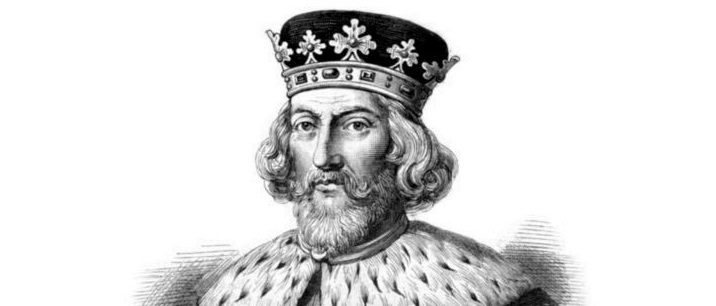King John (Lackland) of England
Posted on 4th January 2021
John was born on 24 December 1166 at Beaumont Palace, Oxfordshire, England, to parents King Henry II of England and Eleanor of Aquitaine.
He was the youngest of five sons and was therefore never expected to inherit the throne or indeed make anything of his life at all. Due to his lack of position in life, his father nicknamed him ‘Lackland’.
Johns elder brothers William and Henry died young; his brother Geoffrey died in 1186; this left John second in line to the throne behind his brother Richard.
John had little contact with his parents in his youth and was sent to Fontevraud Abbey in Anjou, France to be raised and educated.
Even though John was nicknamed ‘Lackland’, he became his father’s favourite son, who bestowed many lands on him; this made his mother and elder brothers unhappy.
Johns mother Eleanor was imprisoned by her husband Henry following an unsuccessful revolt by her and her elder sons in 1173 – 1174; however, the sons were treated leniently.
John was known to be treacherous, he would conspire both with and against his brothers, depending on the best result for him. In 1184 John claimed, as Richard did, to be the rightful heir to Aquitaine. This disagreement would be the first of many with his brother Richard.
In 1185 John made his first visit to Ireland; he did not remain long after offending the Irish rulers returning to England later the same year.
John married Isabelle of Gloucester on 29 August 1189 at Marlborough Castle, but this marriage was later declared invalid and annulled in 1199.
Richard became king in 1189, but chose to join the crusades. To buy John’s loyalty while he was away, he bestowed many lands and titles on him and John vowed not to return to England for three years, but to stay in France.
Richard left for the crusades, but returned in 1194 after John tried unsuccessfully to seize control of England.
In 1199 Richard died, having not left an heir. Although Arthur, son on his deceased elder brother Geoffrey laid claim to the throne, John was crowned King on 27 May 1199 at Westminster.
Reign 1199 - 1216
Arthur fought John for the throne of England with the support of Philip II of France. Both sides tried negotiation, but this failed and war commenced. John had strengthened his position with many French nobles switching to his side. Philip II now abandoned Arthur and in May 1200 signed the Treaty of Le Goulet; Philip now recognised John as the rightful heir to Richard; John accepted Philip as the legitimate feudal overlord of his lands in France. This peace would only last two years.
John married Isabella of Angouleme in 1200 following the annulment of his first marriage in 1199, however Isabella was already engaged to Hugh de Lusignan, himself from a noble family. Enraged by John and Isabella’s marriage, Hugh de Lusignan led an uprising against him, but this was crushed; the hatred between them, however would long continue.
John spent much of his reign in conflict with France and by 1204 had lost control of nearly all his interests and possessions in France; only the Duchy of Aquitaine remained under his control. He then spent the rest of his reign trying to retake control of Normandy.
To fund the campaigns against France, John continued to raise taxes; this made him unpopular with his barons. Negotiations with the barons failed and civil war broke out in May 1215. The rebels were successful in taking control of cities culmination in the seizure of London.
John met the rebel leaders at Runnymede near London on 15 June 1215; this negotiation led to the signing of Magna Carta; an agreement that would limit the Kings powers. A formal document stating that the King as well as his people was not above the laws of the land.
Almost immediately after signing the document, John sought to break it and had the Pope declare it invalid.
Civil war now raged again, the First Barons War; this time the barons had French support.
Johns relationship with the church had been poor, having been excommunicated in November 1209, however he did gain the support of the Pope in his dispute with the barons.
John travelled north, leading expeditions against rebel forces. Prince Louis VIII of France invaded at the baron’s request, taking control of Rochester and much of the south of the country. At one point the French held control of over one third of England and the support of the majority of the barons.
While retreating from French forces, John became ill, and this worsened as he continued to travel; when he reached Newark Castle he could travel no more.
King John died on 18 October 1216 at Newark Castle and is buried in Worcester Cathedral.
His young son was to become Henry III.
Tagged as: Junior Middle Ages
Share this post:





